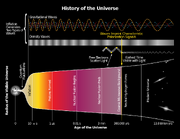ML4E (Message Wall | contribs) m (More informative, I think.) Tag: sourceedit |
No edit summary |
||
| (5 intermediate revisions by 3 users not shown) | |||
| Line 1: | Line 1: | ||
| − | [[image:History of the Universe.svg.png|thumb|right]]The term '''Big Bang''' has three related meanings. It refers to the observable facts of the evolution of the universe. It is also a cosmological model in which the universe has been expanding for around 13.7 billion years (13.7 Ga), starting from a tremendously dense and hot state. The term is also used in a narrower sense to describe the fundamental 'fireball' that erupted at or close to time t=0 in the history of the universe. |
+ | [[image:History of the Universe.svg.png|thumb|right]]The term '''Big Bang''' has three related meanings. It refers to the observable facts of the evolution of the universe. It is also a cosmological model in which the universe has been expanding for around 13.7 billion years (13.7 Ga), starting from a tremendously dense and hot state. The term is also used in a narrower sense to describe the fundamental 'fireball' that erupted at or close to time t=0 in the history of the universe. Georges Lemaître, a [[Catholic]] priest from [[Belgium]], proposed "hypothesis of the primeval atom" in 1927; this is considered to be the first published version of the Big Bang. |
==Big Bang in "[[Before the Beginning]]"== |
==Big Bang in "[[Before the Beginning]]"== |
||
| − | [[Time-viewer]] downloads of '''the Big Bang''' event were not popular among the general population. The events that created the universe were almost impossible to comprehend to non-cosmologists, despite the best efforts of the editors. |
+ | [[Time-viewer]] downloads of '''the Big Bang''' event were not popular among the general population. The events that created the universe were almost impossible to comprehend to non-cosmologists, despite the best efforts of the editors. The 1968 motion picture [[2001: A Space Odyssey (Before the Beginning)|''2001: A Space Odyssey'']], even with its aged special effects, was regarded as more exciting than seeing the actual Big Bang.<ref>''Futureshocks'', pg. 94. </ref> |
| + | ==References== |
||
| + | {{Reflist}} |
||
{{Before the Beginning}} |
{{Before the Beginning}} |
||
| − | [[Category: |
+ | [[Category:Time-Viewer Recordings]] |
[[Category:Natural Phenomena]] |
[[Category:Natural Phenomena]] |
||
Revision as of 09:25, 20 July 2020

The term Big Bang has three related meanings. It refers to the observable facts of the evolution of the universe. It is also a cosmological model in which the universe has been expanding for around 13.7 billion years (13.7 Ga), starting from a tremendously dense and hot state. The term is also used in a narrower sense to describe the fundamental 'fireball' that erupted at or close to time t=0 in the history of the universe. Georges Lemaître, a Catholic priest from Belgium, proposed "hypothesis of the primeval atom" in 1927; this is considered to be the first published version of the Big Bang.
Big Bang in "Before the Beginning"
Time-viewer downloads of the Big Bang event were not popular among the general population. The events that created the universe were almost impossible to comprehend to non-cosmologists, despite the best efforts of the editors. The 1968 motion picture 2001: A Space Odyssey, even with its aged special effects, was regarded as more exciting than seeing the actual Big Bang.[1]
References
- ↑ Futureshocks, pg. 94.
| |||||